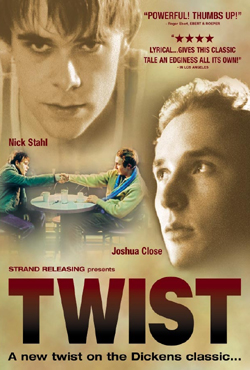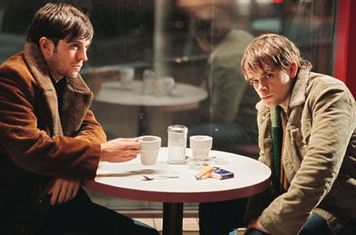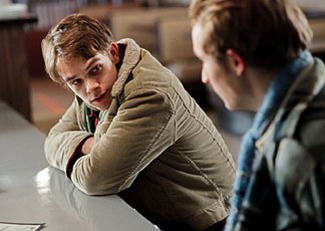
Charles Dickens’ Oliver Twist story has been told and retold numerous times in cinema, from Roman Polanski’s take to the iconic musical adaptation.
But one version seems to have slipped under the radar. Twist, from director Jacob Tierney, relocates the story from Victorian London to early-2000s Toronto, and tells the story from the perspective of the Artful Dodger, or Dodge as he is known here.

Twist is an interesting film, in that its successes and pitfalls are intrinsically linked. One of the film’s greatest successes is the fact that Bill Sykes remains unseen throughout, his almost mythic status making him seem even more sinister and terrifying. Sadly, this has the knock on effect of denying viewers the pivotal moment of what happens to Nancy, which is only discussed by other characters, and Dodge’s final, bloody retribution is shown only through sound effects behind a closed door. It’s an interesting technique, but a more satisfying ending would be to see Dodge actually lose it. The measures taken to modernise the story, turning Fagin’s boys from starving pickpockets to drug addicted prostitutes, is a fantastic idea. Sadly, the attention to detail here is poor, with supposed heroin addict Charley’s arms entirely free of track marks and looking completely healthy. Oliver’s naivety is kept intact, and the unrequited love angle certainly makes sense of why he so willingly follows Dodge into such depths, but very little is resolved of this plotline. One positive which has no criticisms is the fact that Oliver is rejected by the Senator and his wholesome family. While it may have worked for Oliver to find his real family in the original story, with these changes, a downbeat ending makes much more sense.

While Twist is in no way perfect, or even an excellent film, it can still be considered a decent and interesting watch, and most of this is down to a magnetic central performance from Nick Stahl as Dodge. Stahl captivates your attention in his every second on screen, and effortlessly sells some of the film’s more obviously emotionally manipulative moments. As Oliver, Nancy, and Charley, Joshua Close, Michèle-Barbara Pelletier, and Moti Yona give fine performances, with Close particularly selling Oliver’s innocence, but with so much focus on Dodge’s struggle, they are given relatively little to do. Meanwhile, Gary Farmer manages to straddle that fine line between sympathetic and sinister that Ron Moody did so expertly in his take on Fagin.
Twist is well worth a watch. While it is not wholly successful, it is an interesting take on a well-known classic, which is not afraid to experiment, and shows a lot of promise. While there are some pitfalls in story and direction, and a couple of scenes that some viewers may find especially comfortable to watch, it is worth viewing for Stahl’s stellar performance alone.

 RSS Feed
RSS Feed
